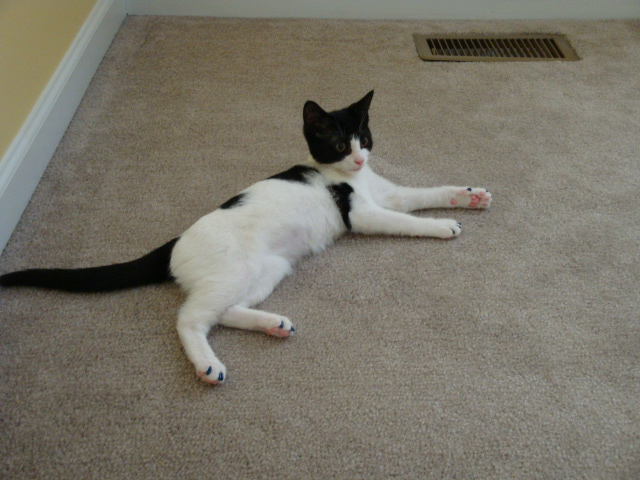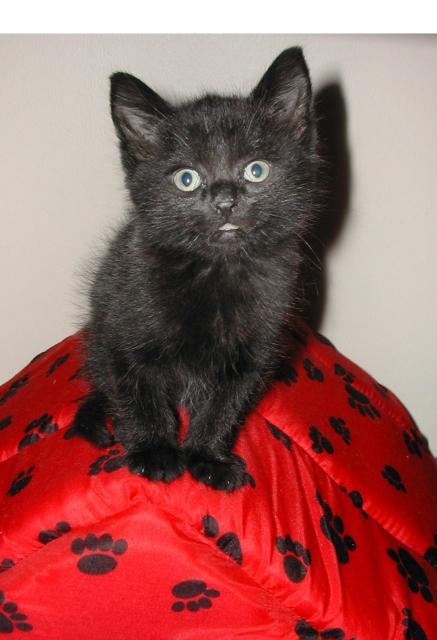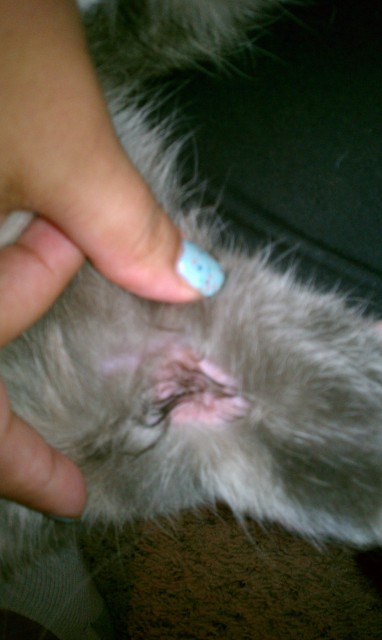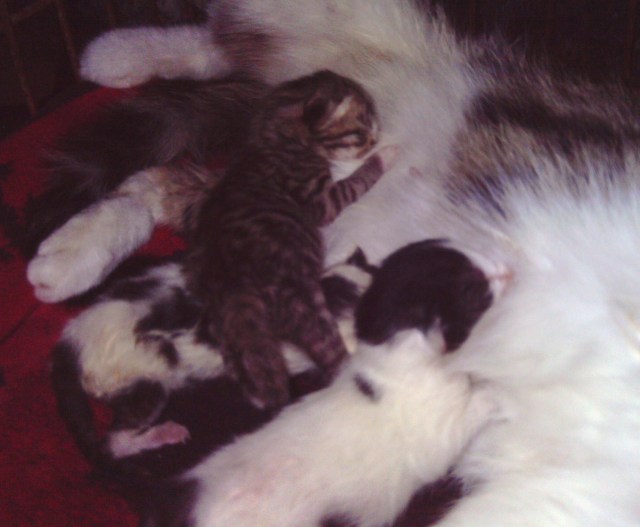QuestionHi Ali,
I have a mature orange tabby male, approx. 5 years old. He is accustomed to being outdoors all the time and frequently roams the neighborhood and brings mice and rats home. This cat lives at my parents house. The behaviour of him decapitating bunnies and bringing them to the door along with the night howls is becoming too much for my parents and they want him out, and since he is my cat, I am considering bringing him to my home. The major set backs I see with this are that I live on a busy highway and I have a 1.25 year old female pug mix. The cat is not fond of people who don't like cats, and I'm pretty sure he doesn't like dogs, he pretty much keeps to himself. Is relocating this cat to my home sound like a good idea? I'm worried about him urinating due to stress and I just renovated.I don't mind the hunting of the cat so much, but am more concerned that he will venture off onto the highway into the path of an unsuspecting driver. I don't think there is a way to keep him off the highway unless I put barbed wire on my fence, but he can still go into neighbours yards and jump over that way.
I don't want to give him away either, because I worry that he won't be taken care of and we already have a feral cat problem in the area, so there are plenty of cats to go around. I'm really torn here.
Thanks!
AnswerStephanie,
I've taken a day to do some in depth thinking about the situation with your kitty, the conflicts his behaviors are causing with your parents and your current living situation. I've come to the conclusion that this situation really doesn't have any simple solutions or easy answers that are going to make everyone including your parents, your cat and you completely happy. One thing that came across in your email is that you obviously love this kitty very much and from what I can see you truly want suggestions that work within your cat's best interests as well as what's going to work out well in terms of solving the current conflicts between your kitty's behavior and your parents' ability to cope with his instinctive behaviors. I don't know if there really is a way to please everyone and completely resolve all of the issues within this situation so I'm going to put my best effort forward and attempt to provide options that are within the cat's best interests and that will hopefully ensure that your little guy's life remains as stable as possible.
If I understand you correctly the issues are quite simple, your cat routinely kills birds and small mammals and leaves them on your parents' doorstep which isn't well received by them and your cat howls quite loudly and frequently at night. I may be able to offer some suggestions that may help to minimize or eliminate some of the behaviors that your parents would prefer not to deal with which may allow your cat to continue living with your parents and keep many of his daily routines the same as they've been since he moved into your parents' home. I'm not sure if your parents would consider caring for your kitty while you carry out the basic suggestions that I have to offer which may reduce or eliminate the behaviors they're not happy with. I'm not sure how long this cat has lived with your parents or how long his behaviors have been upsetting them, so I can't guarantee that they'll be receptive to any suggestions aimed at changing the behaviors that your parents are uncomfortable with.
You currently live in close proximity to a busy highway, your parents have been caring for this cat for some time, you aren't prepared to keep this cat indoors and you have a dog. I'm not sure that coming to live with you is in the cat's best interests for a variety of reasons including the likelihood that he will be hit by a car and seriously injured or killed. In this situation it's important to see things from your cat's point of view, this cat may belong to you, however he's been cared for by your parents for awhile, which means that in his mind your parents are his primary caregivers. I'm not sure exactly what the situation is in terms of where your parents are at when it comes to this cat's behaviors and whether they'd be willing to work with you to change them so that the cat could stay in his current living situation which would minimize the stress he would experience. If your parents are willing to work out some compromises that would allow this cat to remain with them under their care without disrupting his daily routines it would be less stressful for your cat and it would minimize the chance that he'd develop behavioral issues which may cost him his life.
Since your cat is an indoor/outdoor cat he's most likely learned that dogs are dangerous and scary since some people allow their dogs to chase cats that roam freely within the neighborhood. My recommendations if you wanted to bring your cat home to live with you would consist of the following - consult with a holistic vet (veterinarian trained in conventional medicine as well as one or more alternative therapies which may include homeopathy, acupuncture, herbal medicine or massage to name a few of the more common alternatives to traditional medicine) about minimizing the strain on this kitty and the anxiety that moving to a new environment may cause. Seeking the help of an experienced animal behaviorist who specializes in cat behavior is also a good idea, s/he may be able to offer information that would help to make your cat's transition into your household more comfortable and minmize the chances of him developing behavioral issues. To be honest there's no real guarantee that your cat won't start having behavorial issues if you move him, my concern would be that there's a recipe for disaster in this situation - your cat may get hit by a car and die as a result of his injuries or he may develop behavioral issues that mean you'll eventually euthanize him after unsuccessfully attempting to change them.
Cats tend to feel secure and be comfortable when their lives are predictable and made up of consistent routines. Cats are quite territorial by nature, they tend to claim a specific area as their territory and identify that area by using pungent smelling urine to mark different areas within their home range. Cats have evolved over thousands of years as the ultimate hunter, in fact their ability to control the rodent population and keep mice and rats away from grain stores is the reason that cats were originally domesticated by ancient Egyptians. As disgusting and distasteful as your parents find your cat's habit of leaving deceased wildlife on their doorstep it's meant as a compliment. Essentially your cat is giving your parents a gift when he leaves dead birds, bunnies, rats and mice on their doorstep where his caregivers can't miss them. This behavior is essentially your cat's way of thanking your parents for the care he receives and letting them know how much he loves them - he has no way of knowing that your parents don't understand that he's giving your parents an unwelcome gift that they find distasteful. Asking a cat not to hunt just isn't going to work, but you can make it more difficult for this little fellow to catch his prey by making a break away collar that's equipped with one or more bells a part of his regular wardrobe. If your cat is an average sized cat you can purchase a bear bell to attach to your cat's collar from a store specializing in outdoor/camping gear such as Mountain Equipment Co-op or similar retail store. Bear bells usually have a sturdy loop that fastens to a cat or dog's collar securely with velcro and although these bells are a bit on the large side they'll crimp your boy's style when it comes to hunting because they'll know he's coming. Fitting your cat with a break away collar that's fitted with a bear bell provides the local birds and wildlife with an early warning system, this means that your cat will not catch prey as frequently as he currently does and that means that he's not going to be able to leave decapitated wildlife on the doorstep anywhere near as frequently as he does now.
Sometimes changing a cat's diet and starting to feed him a well balanced, homemade, organic raw diet (check out catinfo.org or catnutrition.org for recipes) will stop a cat from hunting quite so often if his diet is lacking and he's fulfilling nutritional needs that his food doesn't, especially if he's currently eating a commercially produced food that's not suitable for cats. The majority of commercially produced cat foods aren't really species appropriate when it comes to meeting a cat's nutritional needs by providing useable sources of protein, fiber and other nutrients. Cats are obligate carnivores, this means that their diet must be mostly made up of meat, many dry cat foods use vegetable proteins and grains as fillers, ingredients like these don't provide the cat what he needs in a form that he can actually use, so a diet change just might hold an answer to minimize the cat's hunting sprees. If you or your parents aren't comfortable with the idea of feeding a diet made up of raw meat and some basic supplements then there are two commercially produced canned foods that I feel 100% comfortable recommending, Wellness and Spot's Stew by Halo - neither of these foods have ever been recalled for any reason as far as I know. At this point I'm currently feeding a combination of Wellness and Spot's Stew along with my homemade cat food made from the recipe at catnutrition.org (the recipe makes a larger quantity and I have 3 resident cats to feed as well as a couple of foster kitties at any given time, but for a single cat the recipe at catinfo.org should be sufficient). I can provide you with more information about nutrition if you like - my eldest cat MC nearly lost her life to severe acute renal failure during the Menu Foods recalls in 2007 so I've done a great deal of research since then to ensure that I don't put anything in my cats' bowls that could potentially make them sick or end their lives. While fitting this kitty with a bell and changing his diet may reduce his success rate when he's hunting he may eventually find a way to quietly sneak up on wildlife even with the bell on his collar so it's important to realize that there really isn't any foolproof way to prevent this cat from continuing to hunt short of keeping him indoors or building a fenced in/caged cat run in the yard that the cat can spend time in as he wishes whenever he wants. You could purchase a large dog kennel made from chain link fencing from a hardware store and modify it so that the cat's kennel has a bottom and top made from chain link fencing or chicken wire to prevent accidental escapes. A cat must never be left unattended in a cat run when he's not able to go indoors as he wishes because the cat may overheat or develop hypothermia depending on the weather and the length of time he's outside. Ideally a cat run would be connected to a kitty door so that the cat could come and go as he pleases, but this may not be a suitable option for you or your parents.
Intact tom cats have some pretty unpleasant behaviors that tend to be poorly received by their caregivers. These behaviors include marking territory with urine or feces, fighting with other male cats to win mating rights, wandering surprising distances away from home to find intact female cats who are receptive to mate, caterwauling as a display meant to intimidate another intact male cat rather than fighting and risking injury if it's not necessary. The main ethical concern when it comes to deciding whether or not to neuter your tom is that there is a substantial pet overpopulation issue that affects communities, shelters and rescue organizations worldwide. There are also serious medical risks for toms who aren't neutered. Intact toms can develop testicular or prostate cancer or they may require treatment for abscesses caused by bite wounds received during a fight with another cat. Cats may also contract serious viral/bacterial infections as a result of sexual contact, these infections can include the herpes virus, feline leukemia and FIV (Feline Immunodeficiency Virus, commonly referred to as kitty AIDS), don't worry this virus isn't passed from cat to person. If your cat hasn't been neutered I'd highly recommend that you have him fixed as soon as possible, this will help to protect him from serious health problems now and in the future as well as ensuring that he doesn't contribute to feline overpopulation in your area.
I'm not entirely sure what the situation is with your parents in terms of their levels of frustration with your little man, this is a factor that you really need to consider quite carefully. Although the cat is technically yours as far as he's concerned he lives with your parents, they are his primary caregivers, this is why I'd strongly suggest trying some suggestions that will help reduce or eliminate the behavioral issues that your parents are frustrated with. It may be worth sitting down to have an honest discussion with your parents to determine where they stand on this issue. If your parents aren't comfortable with the idea of continuing to care for your cat I'd say that there are a couple of options:
- You can bring your little man home, allow him several weeks to two months where he's not allowed outside so that he can become comfortable with his new territory then take your chances and allow him outside on his own.
- You can bring your little guy home and keep him as an indoor cat. If you choose this option it's not a bad idea to have a behaviorist come in who has extensive experience with cats and dogs so that s/he can give you suggestions about how best to introduce these guys to each other while minimizing the risk of injuries for you, the cat and the dog.
- You can speak with your vet about finding an excellent permanent home for this cat with a family that's living in an area away from busy, high traffic areas.
- You could consider surrendering this cat to a no kill shelter so that he can be placed for adoption with a loving forever family who is in a better position to provide this little guy with the safe environment he needs.
- You could consider boarding this kitty at a cattery or vet clinic until you've decided what's in his best interests if your parents are at the end of their rope and unable to deal with this kitty any longer.
- If the cat isn't neutered you could have the vet perform the surgery, board the cat until he heals and is using his litter box as he's supposed to then speak with your parents to see if they'd be willing to open their home for this kitty again.
- You could go ahead and neuter the cat, board him and bring him home once he's using the litter box reliably.
To be honest I'm really not sure what's going to work for you, your cat and your parents. I'm not sure if your parents are willing to compromise and continue caring for your cat if you can provide solutions for the behaviors that upset your parents most. If your cat stays with your parents he'll be less stressed than he would be if he went into any new environment, this means that he'd be less likely to develop serious behavioral issues that may cost him his life. To be completely honest the reality of having an indoor/outdoor cat in an area close to a busy road of any description means that his days are numbered because in all likelihood he will eventually get hit by a car - maybe he'll survive after being seriously injured, if that happens he will most likely need extensive and expensive medical care. If your cat is hit by a car travelling at highway speeds his injuries are more like to be fatal or so extensive that euthanasia is the most humane choice to be made, I'd hate to see you lose your cat this way, it's very traumatic. I really do want to help you find some alternatives that will work for you, your cat and your parents. If you have any further questions, concerns or you'd like me to explain anything in this answer, please do not hesitate to contact me again.

 Cat training/Runs away whenever downstairs
Question
Kairi in her room
Hi there!
I recently
Cat training/Runs away whenever downstairs
Question
Kairi in her room
Hi there!
I recently
 Short Tailed Manx Kitten
Question
Una Mica Una Mica
Hello,
I go
Short Tailed Manx Kitten
Question
Una Mica Una Mica
Hello,
I go
 kittens nails
QuestionQUESTION: Hi Pati,
Its me again Xris. I seek y
kittens nails
QuestionQUESTION: Hi Pati,
Its me again Xris. I seek y
 Small bald spot?
Question
Chibi arm
I was playing with my almost
Small bald spot?
Question
Chibi arm
I was playing with my almost
 Labor Stalled?
QuestionQUESTION: Recently a very pregnant cat adopted
Labor Stalled?
QuestionQUESTION: Recently a very pregnant cat adopted